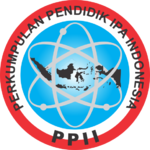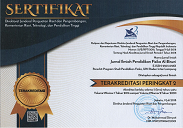Digital Story Conceptual Change Oriented (DSCC) to Reduce Students’ Misconceptions in Physics
Abstract
Keywords
Full Text:
PDFReferences
Akcay, S. (2016). Analysis of Analogy Used in Secondary Education Science Textbooks in Turkey. Educational Research and Reviews, 11(19), 1841–1851. https://doi.org/10.5897/err2016.2984
Atasoy, Ş., & Ergin, S. (2017). The Effect of Concept Cartoon-Embedded Worksheets on Grade 9 Students’ Conceptual Understanding of Newton’s Laws of Motion. Research in Science and Technological Education, 35(1), 58–73. https://doi.org/10.1080/02635143.2016.1248926
Aydın, S. (2017). Eliminating the Misconceptions about Image Formations in Plane Mirrors by Conceptual Change Texts. International Journal of Social Sciences and Education Research, 3(4), 1394–1403. https://doi.org/10.24289/ijsser.320030
Balaman, F. (2017). The Effects of Digital Storytelling on the Students’ Project Based Virtual Learning Qualifications. Curr Res Educ, 3(32), 81–94.
Batsila, M., & Tsihouridis, C. (2016). “Once Upon a Time there was...” A Digital World for Junior High School Learners. International Journal of Emerging Technologies in Learning, 11(3), 42–50. https://doi.org/10.3991/ijet.v11i03.5370
Choi, G. Y. (2018). Learning through Digital Storytelling: Exploring Entertainment Techniques in Lecture Video. Educational Media International, 55(1), 49–63. https://doi.org/10.1080/09523987.2018.1439710
Dewi, N. R., Savitri, E. N., Taufiq, M., & Khusniati, M. (2018). Using Science Digital Storytelling to Increase Students’ Cognitive Ability. International Conference on Science Education (Vol. 1006, pp. 1–5). https://doi.org/10.1088/1742-6596/1006/1/012020
Halim, L., Yong, T. K., Subahan, T., & Meerah, M. (2014). Overcoming Students’ Misconceptions on Forces in Equilibrium: An Action Research Study. Creative Education, 5(June), 1032–1042. https://doi.org/dx.doi.org/10.4236/ce.2014.511117
Hussain, H., & Shiratuddin, N. (2016). The digital Storytelling Process: A Comparative Analysis from Various Experts. In Proceedings of the International Conference on Applied Science and Technology 2016 (ICAST’16) (Vol. 1761, pp. 1–7). https://doi.org/10.1063/1.4960884
Kotluk, N., & Kocakaya, S. (2016). Researching and Evaluating Digital Storytelling as A Distance Education Tool in Physics Instruction: An Application with Pre-Service Physics Teachers. Turkish Online Journal of Distance Education, 17(1), 87–99. https://doi.org/10.17718/tojde.59900
Kurniawan, Y. (2018a). Investigasi Level Miskonsepsi pada Hukum III Newton. Jurnal Riset Dan Kajian Pendidikan Fisika, 5(1), 17–21. Retrieved from http://journal.uad.ac.id/index.php/JRKPF/article/viewFile/8625/pdf_65
Kurniawan, Y. (2018b). Investigation of the Misconception in Newton II Law. Jurnal Pena Sains, 5(1), 11–18.
Kurniawan, Y., Suhandi, A., & Hasanah, L. (2016). The Influence of Implementation of Interactive Lecture Demonstrations (ILD) Conceptual Change Oriented toward The Decreasing of The Quantity Students' Misconceptions on The Newton’s First Law. In AIP Conference Proceedings (Vol. 1708, pp. 07007-1-070007–5). https://doi.org/10.1063/1.4941180
Maddine, E. (2014). Monitoring and Assessing Digital Story Projects in Middle Grades English Language Arts. Kentucky Journal of Excellence in College Teaching and Learning, 12(1), 647–654. Retrieved from http://www.editlib.org/p/22117
Metruk, R. (2018). the Journal of Teaching English for Specific and Academic Purposes Comparing Holistic and Analytic Ways of Scoring in the Assessment of Speaking Skills. The Journal of Teaching English For Specific and Academic Purposes, 611189(1), 179–189. https://doi.org/10.22190/JTESAP1801179M
Muliyani, R. (2018). The Implementation of Refutation Text in Predict-Observe-Explain (POE) Learning Model to Decrease Students’ Misconception. Journal of Educational Research and Evaluation, 2(2), 62–71. Retrieved from https://ejournal.undiksha.ac.id/index.php/JERE
Muliyani, R., & Kaniawati, I. (2015). Identification of Quantity Students’ Misconceptions on Hydrostatic Pressure with Three Tier-Test. In Global Trends in Academic Research (Vol. 2, pp. 716–721). Retrieved from www.globalilluminators.org
Nassim, S. (2018). Digital Storytelling: An Active Learning Tool for Improving Students’ Language Skills. PUPIL: International Journal of Teaching, Education and Learning, 2(1), 14–27. https://doi.org/10.20319/pijtel.2018.21.1427
Niemi, H., & Multisilta, J. (2016). Digital Storytelling Promoting Twenty-First Century Skills and Student Engagement. Technology, Pedagogy and Education, 25(4), 451–468. https://doi.org/10.1080/1475939X.2015.1074610
Özpinar, İ., Gökçe, S., & Yenmez, A. A. (2017). Effects of Digital Storytelling in Mathematics Instruction on Academic Achievement and Examination of Teacher-Student Opinions on the Process. Journal of Education and Training Studies, 5(10), 137. https://doi.org/10.11114/jets.v5i10.2595
Potvin, P., & Cyr, G. (2017). Toward a Durable Prevalence of Scientific Conceptions: Tracking The Effects of Two Interfering Misconceptions about Buoyancy from Preschoolers to Science Teachers. Journal of Research in Science Teaching, 54(9), 1121–1142. https://doi.org/10.1002/tea.21396
Prins, E. (2017). Digital Storytelling in Adult Education and Family Literacy: A Case Study from Rural Ireland. Learning, Media and Technology, 42(3), 308–323. https://doi.org/10.1080/17439884.2016.1154075
Psomos, P., & Kordaki, M. (2015). A Novel Educational Digital Storytelling Tool Focusing on Students Misconceptions. Procedia - Social and Behavioral Sciences, 191(2005), 82–86. https://doi.org/10.1016/j.sbspro.2015.04.476
Razmi, M., Pourali, S., & Nozad, S. (2014). Digital Storytelling in EFL Classroom (Oral Presentation of the Story): A Pathway to Improve Oral Production. Procedia - Social and Behavioral Sciences, 98(2011), 1541–1544. https://doi.org/10.1016/j.sbspro.2014.03.576
Sanabria, J. C., & Arámburo-Lizárraga, J. (2017). Enhancing 21st Century Skills With AR: Using the Gradual Immersion Method to Develop Collaborative Creativity. Eurasia Journal of Mathematics, Science and Technology Education, 13(2), 487–501. https://doi.org/10.12973/eurasia.2017.00627a
Santyasa, I. W., Warpala, I. W. S., & Tegeh, I. M. (2018). The Effect of Conceptual Change Model in the Senior High School Students’ Understanding and Character in Learning Physics. SHS Web of Conferences (Vol. 42, p. 00058). https://doi.org/10.1051/shsconf/20184200058
Tandon, A., Singh, M. S., & Poojapathak, M. (2018). Latest Trends and Innovations in Teaching & Learning Methods. International Conference on Recent Innovation in Management, Engineering, Science and Technology (pp. 513–518).
Tasoglu, A. K., & Bakac, M. (2014). The Effects of Problem Based Approach on Conceptual Understanding in Teaching of Magnetism Topics. Eurasian Journal of Physics and Chemistry Education, 6(2), 110–122.
Thang, S. M., Sim, L. Y., Mahmud, N., Lin, L. K., Zabidi, N. A., & Ismail, K. (2014). Enhancing 21st Century Learning Skills Via Digital Storytelling: Voices of Malaysian Teachers and Undergraduates. Procedia - Social and Behavioral Sciences (Vol. 118, pp. 489–494). Elsevier B.V. https://doi.org/10.1016/j.sbspro.2014.02.067
Üce, M., & Ceyhan, İ. (2019). Misconception in Chemistry Education and Practices to Eliminate Them: Literature Analysis. Journal of Education and Training Studies, 7(3), 202. https://doi.org/10.11114/jets.v7i3.3990
Vivitsou, M., Niemi, H., & Kallunki, V. (2017). Teachers’ Practices to Support Student Work in Digital Storytelling: A Study on Finnish and Chinese School Teachers’ Experiences. Seminar.Net, 13(2), 1–23.
Wartono, Hartoyo, D., Nilasari, & Batlolona, J. R. (2019). Real-Virtual Monte Carlo Simulation on Impulse-Momentum and Collisions. Indonesian Journal of Electrical Engineering and Computer Science, 13(1), 7–14. https://doi.org/10.11591/ijeecs.v13.i1.pp7-14
Durak, H., Y. (2018). Digital Story Design Activities Used for Teaching Programming Effect on Learning of Programming Concepts, Programming Self-Efficacy, and Participation and Analysis of Student Experiences. Journal of Computer Assisted Learning, 34(6), 740–752. https://doi.org/10.1111/jcal.12281
Zlatkin-Troitschanskaia, O., Shavelson, R. J., Schmidt, S., & Beck, K. (2019). On the Complementarity of Holistic and Analytic Approaches to Performance Assessment Scoring. British Journal of Educational Psychology, 1–17. https://doi.org/10.1111/bjep.12286
DOI: http://dx.doi.org/10.24042/jipfalbiruni.v8i2.4596
Refbacks
- There are currently no refbacks.

Jurnal ilmiah pendidikan fisika Al-Biruni is licensed under a Creative Commons Attribution-ShareAlike 4.0 International License.
![]()








